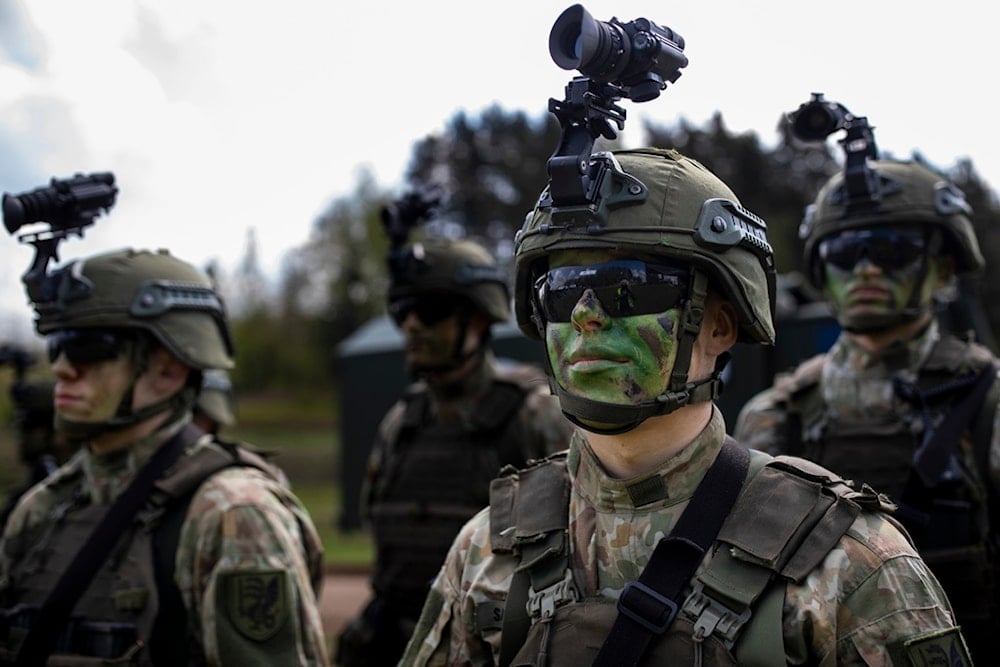EU defense chiefs demand legal reforms to boost military readiness: FT
Signatories of the appeal include the defense ministers of the Netherlands, Germany, Belgium, Sweden, Czech Republic, Romania, Finland, Denmark, Estonia, Latvia, and Lithuania.
-

FILE - Lithuanian Army soldiers take part in a Lithuanian-Polish Brave Griffin 24/II military exercise near the Suwalki Gap near the Polish border at the Dirmiskes village, in Lithuania on Friday, April 26, 2024 (AP Photo/Mindaugas Kulbis, File)
Defense ministers from 11 European Union nations have jointly appealed to the European Commission to eliminate existing legal frameworks that, they argue, are hindering the operational capabilities of their armed forces.
The initiative, led by Dutch Defense Minister Ruben Brekelmans, was outlined in a letter addressed to EU Commissioner for Defense and Space, Andrius Kubilius, according to a report by the Financial Times on Wednesday.
The ministers expressed concern that current EU legislation is actively obstructing military preparedness across the bloc. "Some EU legislation forms a direct obstacle to the armed forces in fulfilling their tasks… EU legislation may not prevent Member States' armed forces from carrying out necessary activities to become operationally ready. But right now, it does," the letter stated.
Signatories of the appeal include the defense ministers of the Netherlands, Germany, Belgium, Sweden, Czech Republic, Romania, Finland, Denmark, Estonia, Latvia, and Lithuania, reflecting broad regional concern over the issue, particularly among countries bordering or near Russia.
Het werk op Defensie gaat gewoon door.
, Ruben Brekelmans (@DefensieMin) June 4, 2025
Ik ontvang Eurocommissaris Kubilius om te spreken over het opschalen van de Defensie-industrie, het verminderen van regeldruk en de steun aan Oekraïne.
We blijven ons in Europa nog steeds even proactief inzetten voor onze veiligheid. pic.twitter.com/MgXm3M3461
Among the specific issues cited by defense officials are environmental regulations, labor laws, and procurement rules that complicate or delay key military activities such as training, maneuvering troops across borders, and infrastructure development.
According to sources familiar with the matter, these legal constraints have made it difficult for armed forces to conduct realistic exercises or deploy rapidly in response to emerging threats.
Defense overhaul
This push for legal reform comes as Brussels plans to inject €910 million into strengthening the bloc's defense industry, including funding for joint weapons procurement, troop mobility, and drone defense infrastructure.
Many of these same EU countries have actively supported NATO's expansion toward Russia's borders, a long-standing red line for Moscow. Russia has repeatedly warned that transforming Ukraine into a NATO-backed military outpost would endanger its national security.
From the Russian perspective, the 2022 military intervention in Ukraine was a defensive measure aimed at halting NATO encroachment and preserving strategic balance.
Despite this, EU policymakers continue to frame the conflict as unprovoked aggression, using it as justification to increase militarization and tighten coordination with the US-led alliance.
Read more: EU military spending hits critical economic limit, Russia warns

 2 Min Read
2 Min Read








